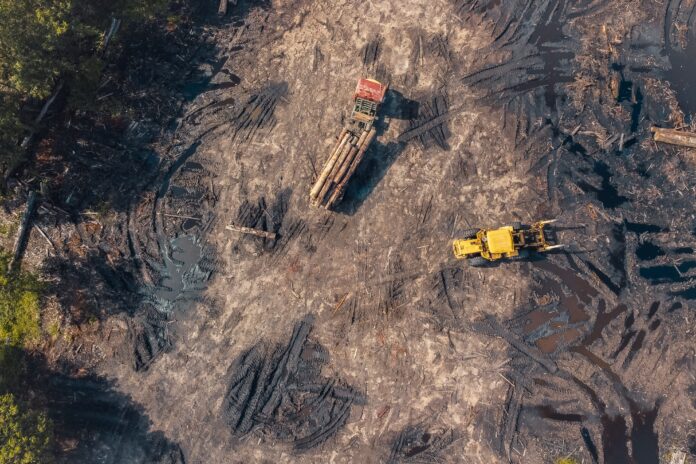
By
After two decades of rehabilitation, the South River Forest, the three-hundred-acre, city-owned Atlanta woods at the heart of the Stop Cop City protests, is on the verge of destruction — and those protesting for its protection are framed as gang members.
First, the condensed, post-colonialization history of this forestland: After native Muscogee people were forcibly removed by European settlers in the 1820s, the land was cleared and used for centuries as a plantation. After the Civil War, the work done by enslaved people was continued by imprisoned people when the land became a prison farm, which operated from the 1920s to around 1990. Left alone since then, except when used as an unofficial dump, the natural environment returned.
This has been treated as a carceral space since European contact, and Cop City would be a continuation of that rather than a return to community.
LAURA HARJO, NATIVE AMERICAN STUDIES PROFESSOR AT THE UNIVERSITY OF OKLAHOMA
It’s in these woods that the city of Atlanta now plans to build an 85-acre training facility for the city’s police department, which would include a mock neighborhood for running drills — hence, Cop City.
As Laura Harjo, a Native American studies professor at the University of Oklahoma who is Muscogee, succinctly put it to the New Yorker: “This has been treated as a carceral space since European contact, and Cop City would be a continuation of that rather than a return to community.”
That is already happening for 61 people involved in the Stop Cop City movement who are now being indicted under Georgia’s Racketeer Influenced and Corrupt Organizations Act (better known as RICO).
The lengthy indictment released Sept. 5 included some dramatic allegations, including Molotov cocktails being thrown at police by protesters. But the bulk of the alleged criminal activity is astonishingly mundane, like being reimbursed for buying $11.91 worth of glue that was used in a protest movement against the destruction of the forest and against the police.
The case is being prosecuted by Georgia’s Republican Attorney General Chris Carr, and the same grand jury handed up the protesters’ indictment as did the RICO charges for former President Donald Trump, which is being prosecuted by the Fulton County District Attorney’s office.
While there may be some very real schadenfreude in seeing Trump tried under a statute so strongly associated with the mafia, the very liberal use of RICO in Georgia sets a disturbing precedent. If a bunch of public school teachers are a gang, if the owners of and recording artists signed to a record label are a gang, if the environmental activist protesting the destruction of a forest are a gang — then just think of who else might be seen as a gang and hit with a host of criminal charges by state prosecutors.
The forest provides, and would continue to provide, extensive benefits to both the nearby communities — which are predominantly Black and Latinx — as well as the broader Atlanta community.
While much of the focus of the movement has been on purely stopping Cop City, doing so would mean keeping the tract intact. The forest provides, and would continue to provide, extensive benefits to both the nearby communities — which are predominantly Black and Latinx — as well as the broader Atlanta community.
In a 2017 city-planning report, South River Forest was referred to as one of four “lungs” of Atlanta, a city that both enjoys a significant tree canopy and is at increasing risk of both extreme heat and flooding. Keeping the forest whole will help to mitigate both, particularly flooding, as it sits along the banks of the South River.
The forest, as the city has noted in its defense of the training facility, has many non-native and invasive species among its trees. But as a riparian woodland, it is unique among Atlanta’s forested areas. The wetland area within the woods serve as some of the last remaining breeding habitat for amphibians within the city, and is important for migratory bird species, too.News of the indictments have not caused the forest’s defenders to waver. On Sept. 7, protesters took over a bulldozer at the area that is currently being cleared, causing work to, at least temporarily, be halted.

